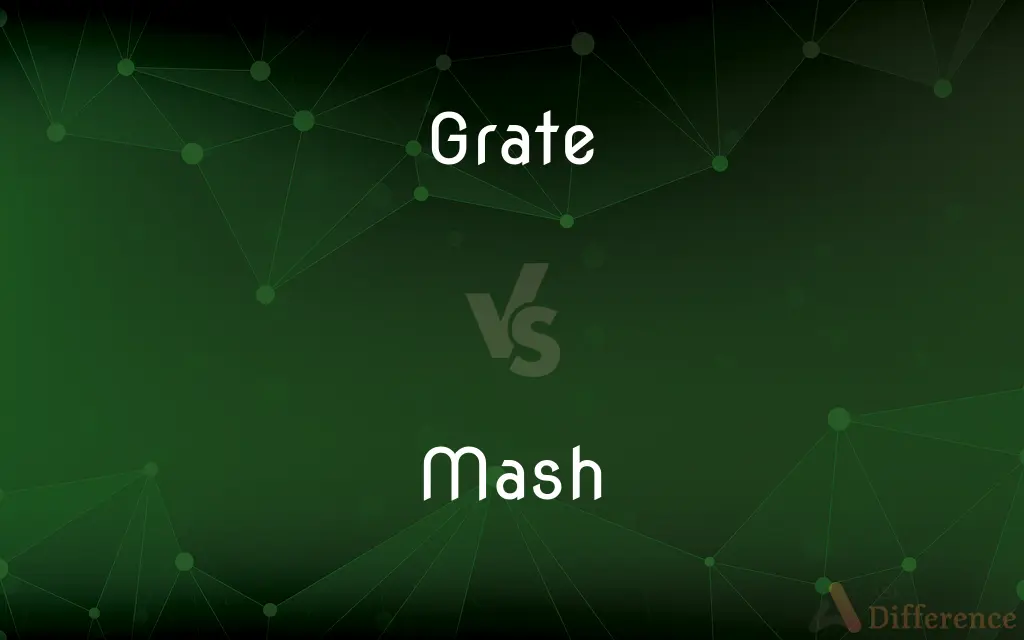Grate vs. Mash — What's the Difference?
Edited by Tayyaba Rehman — By Urooj Arif — Updated on May 17, 2024
Grate involves shredding food into fine pieces using a grater, while mash entails crushing food into a soft, smooth consistency, typically using a masher or fork.

Difference Between Grate and Mash
Table of Contents
ADVERTISEMENT
Key Differences
Grating is a process of shredding food into small, thin pieces using a grater, commonly used for cheese, vegetables, or spices. Mashing, on the other hand, involves crushing food into a soft, smooth consistency, often with a masher or fork, suitable for potatoes, bananas, or avocados.
Grating is used to create small, uniform pieces that can be easily incorporated into dishes, such as grated cheese for pasta or shredded carrots for salads. Mashing is typically used to change the texture of food, making it smoother and more cohesive, like mashed potatoes or guacamole.
While grating can be done quickly with a variety of grater sizes, resulting in different textures from fine to coarse, mashing usually takes a bit more effort to achieve the desired smoothness and is often followed by adding other ingredients for flavor and texture.
Grated food retains its fibrous structure, making it ideal for adding texture and even distribution within a dish. Mashed food, however, loses its fibrous structure, becoming a uniform mass that can be mixed with liquids, seasonings, or other mashed foods.
Grating is often used for foods that are harder or firmer, such as carrots, cheese, or zesting citrus fruits. Mashing is typically applied to softer foods that can be easily broken down, like cooked potatoes, ripe avocados, or soft fruits.
ADVERTISEMENT
Both techniques have their unique culinary applications: grating enhances texture and presentation, while mashing transforms the food's consistency for a different culinary experience.
Comparison Chart
Method
Shredding into small pieces
Crushing into a smooth consistency
Common Foods
Cheese, carrots, spices
Potatoes, bananas, avocados
Texture Result
Fine to coarse shreds
Soft, smooth mass
Tools Used
Grater
Masher, fork
Culinary Uses
Adding texture and distribution
Creating smooth mixtures
Compare with Definitions
Grate
Shred into Small Pieces.
I need to grate some cheese for the pizza.
Mash
Crush into Smooth Consistency.
She mashed the potatoes with butter and cream.
Grate
To reduce to fragments, shreds, or powder by rubbing against an abrasive surface.
Mash
Using a Masher or Fork.
Mash the bananas until they are completely smooth.
Grate
To cause to make a harsh grinding or rasping sound through friction
Grated her teeth in anger.
Mash
Uniform Mass.
Mashing the berries creates a smooth sauce for the dessert.
Grate
To irritate or annoy persistently
It always grates me to get put on hold.
Mash
A mixture of malt or other ingredients with water, heated to convert starches into fermentable sugars for use in brewing or distilling.
Grate
(Archaic) To rub or wear away.
Mash
A mixture of ground grain and nutrients fed to livestock and fowl.
Grate
To make a harsh rasping sound
An old gate grating in the wind.
Mash
A soft pulpy mixture or mass.
Grate
To cause irritation or annoyance
A noise that grates on one's nerves.
Mash
Chiefly British Mashed potatoes.
Grate
To equip with a grate.
Mash
A crushing or grinding.
Grate
A harsh rasping sound made by scraping or rubbing
The grate of a key in a lock.
Mash
(Slang) An infatuation or act of flirtation.
Grate
A framework of parallel or latticed bars for blocking an opening.
Mash
To convert (malt or grain) into mash.
Grate
A framework of metal bars used to hold fuel or food in a stove, furnace, or fireplace.
Mash
To convert into a soft pulpy mass by pounding or crushing
Mash potatoes.
Grate
A fireplace.
Mash
Chiefly Southern & South Midland US To apply pressure to; press.
Grate
A perforated iron plate or screen for sieving and grading crushed ore.
Mash
(Slang) To flirt with or make sexual advances to.
Grate
A horizontal metal grill through which water, ash, or small objects can fall, while larger objects cannot.
The grate stopped the sheep from escaping from their field.
Mash
(uncountable) A mass of mixed ingredients reduced to a soft pulpy state by beating or pressure; a mass of anything in a soft pulpy state.
Grate
A frame or bed, or kind of basket, of iron bars, for holding fuel while burning.
Mash
(brewing) Ground or bruised malt, or meal of rye, wheat, corn, or other grain (or a mixture of malt and meal) steeped and stirred in hot water for making the wort.
Grate
(historical) A grapper, a metal ring on a lance behind the grip.
Mash
(mostly UK) Mashed potatoes.
Grate
(transitive) To furnish with grates; to protect with a grating or crossbars.
To grate a window
Mash
A mixture of meal or bran and water fed to animals.
Grate
To shred (things, usually foodstuffs), by rubbing across a grater.
I need to grate the cheese before the potato is cooked.
Mash
(obsolete) A mess; trouble.
Grate
(intransitive) To make an unpleasant rasping sound, often as the result of rubbing against something.
Listening to his teeth grate all day long drives me mad.
The chalk grated against the board.
Mash
(obsolete) A mesh.
Grate
To get on one's nerves; to irritate, annoy.
She’s nice enough, but she can begin to grate if there is no-one else to talk to.
Mash
(obsolete) An infatuation, a crush, a fancy.
Grate
To annoy.
Mash
(obsolete) A dandy, a masher.
Grate
(obsolete) Serving to gratify; agreeable.
Mash
(obsolete) The object of one’s affections regardless of sex.
Grate
Serving to gratify; agreeable.
Mash
A gun.
Grate
A structure or frame containing parallel or crosed bars, with interstices; a kind of latticework, such as is used ia the windows of prisons and cloisters.
Mash
(transitive) To convert into a mash; to reduce to a soft pulpy state by beating or pressure
We had fun mashing apples in a mill.
The potatoes need to be mashed.
Grate
A frame or bed, or kind of basket, of iron bars, for holding fuel while burning.
Mash
(transitive) In brewing, to convert (for example malt, or malt and meal) into the mash which makes wort.
Grate
To furnish with grates; to protect with a grating or crossbars; as, to grate a window.
Mash
(ambitransitive) To press down hard (on).
To mash on a bicycle pedal
Grate
To rub roughly or harshly, as one body against another, causing a harsh sound; as, to grate the teeth; to produce (a harsh sound) by rubbing.
On their hinges grateHarsh thunder.
Mash
To press. en
Grate
To reduce to small particles by rubbing with anything rough or indented; as, to grate a nutmeg.
Mash
To prepare a cup of tea in a teapot; to brew (tea).
Grate
To fret; to irritate; to offend.
News, my good lord Rome . . . grates me.
Mash
To act violently.
Grate
To make a harsh sound by friction.
I had rather hear a brazen canstick turned,Or a dry wheel grate on the exletree.
Mash
To press (a button) rapidly and repeatedly.
Grate
To produce the effect of rubbing with a hard rough material; to cause wearing, tearing, or bruising. Hence; To produce exasperation, soreness, or grief; to offend by oppression or importunity.
This grated harder upon the hearts of men.
Mash
To flirt, to make eyes, to make romantic advances.
Grate
A frame of iron bars to hold a fire
Mash
An abbreviation for Mobile Army Surgical Hospital, consisting of the equipment and personnel required to perform emergency operations on injured soldiers, located in tents near the front lines of combat; as, he worked in the 25th MASH.
Grate
A harsh rasping sound made by scraping something
Mash
A mesh.
Grate
A barrier that has parallel or crossed bars blocking a passage but admitting air
Mash
A mass of mixed ingredients reduced to a soft pulpy state by beating or pressure; a mass of anything in a soft pulpy state. Specifically (Brewing), ground or bruised malt, or meal of rye, wheat, corn, or other grain (or a mixture of malt and meal) steeped and stirred in hot water for making the wort.
Grate
Furnish with a grate;
A grated fireplace
Mash
A mixture of meal or bran and water fed to animals.
Grate
Gnaw into; make resentful or angry;
The unjustice rankled her
His resentment festered
Mash
A mess; trouble.
Grate
Reduce to small shreds or pulverize by rubbing against a rough or sharp perforated surface;
Grate carrots and onions
Grate nutmeg
Mash
To convert into a mash; to reduce to a soft pulpy state by beating or pressure; to bruise; to crush; as, to mash apples in a mill, or potatoes with a pestle.
Grate
Make a grating or grinding sound by rubbing together;
Grate one's teeth in anger
Mash
A mixture of mashed malt grains and hot water; used in brewing
Grate
Scratch repeatedly;
The cat scraped at the armchair
Mash
Mixture of ground animal feeds
Grate
Using a Grater.
She carefully grated the carrots for the salad.
Mash
To compress with violence, out of natural shape or condition;
Crush an aluminum can
Squeeze a lemon
Grate
Creating Thin Slices.
He grated the lemon zest to add flavor to the cake.
Mash
Talk or behave amorously, without serious intentions;
The guys always try to chat up the new secretaries
My husband never flirts with other women
Grate
Resulting in Fine Texture.
Grate the chocolate to sprinkle over the dessert.
Mash
Reduce to small pieces or particles by pounding or abrading;
Grind the spices in a mortar
Mash the garlic
Grate
Uniform Pieces.
Grating the ginger ensures it mixes evenly into the sauce.
Mash
Creating a Soft Texture.
He mashed the avocados to make guacamole.
Mash
Breaking Down Food.
Mash the beans to form the base for the dip.
Common Curiosities
What foods are typically mashed?
Commonly mashed foods include potatoes, bananas, and avocados.
What does it mean to grate food?
Grating food means shredding it into small, thin pieces using a grater.
What tool do you use to grate food?
A grater is used to shred food into small pieces.
What is the texture of grated food?
Grated food has a fine to coarse, fibrous texture.
What tool do you use to mash food?
A masher or fork is used to crush food into a smooth consistency.
What foods are typically grated?
Commonly grated foods include cheese, carrots, and citrus zest.
Can you mash hard foods?
Hard foods need to be cooked or softened before they can be mashed.
What is the texture of mashed food?
Mashed food has a soft, smooth, and uniform texture.
What does it mean to mash food?
Mashing food means crushing it into a smooth, soft consistency using a masher or fork.
Can grating change the flavor of food?
Grating can enhance the flavor by increasing the surface area exposed, such as with spices.
Can you grate soft foods?
Soft foods are generally not suitable for grating as they do not shred well.
What is a common dish that uses mashed ingredients?
Mashed potatoes are a classic example of a dish using mashed ingredients.
What is a common dish that uses grated ingredients?
Grated cheese on pizza or pasta is a common use of grated ingredients.
Is grating or mashing better for adding texture to a dish?
Grating is better for adding texture, while mashing is better for creating smooth mixtures.
Can mashing change the flavor of food?
Mashing can change the texture and make flavors more uniform in a dish.
Share Your Discovery

Previous Comparison
Disbeliever vs. Doubter
Next Comparison
Hilite vs. HighlightAuthor Spotlight
Written by
Urooj ArifUrooj is a skilled content writer at Ask Difference, known for her exceptional ability to simplify complex topics into engaging and informative content. With a passion for research and a flair for clear, concise writing, she consistently delivers articles that resonate with our diverse audience.
Edited by
Tayyaba RehmanTayyaba Rehman is a distinguished writer, currently serving as a primary contributor to askdifference.com. As a researcher in semantics and etymology, Tayyaba's passion for the complexity of languages and their distinctions has found a perfect home on the platform. Tayyaba delves into the intricacies of language, distinguishing between commonly confused words and phrases, thereby providing clarity for readers worldwide.
















































